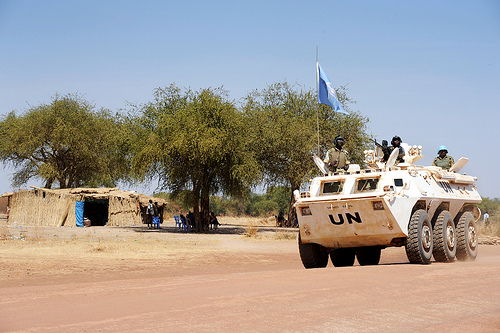
As troops from both the SAF and SPLA continue to swell in the Abyei region, U.N. peacekeepers there face perhaps their toughest test yet to try and contain a potential North-South war. Judging from internal U.N. reports and recent interviews on the ground, inaction in Abyei has cost the U.N. peacekeepers precious credibility with the local population that once lost will be very difficult to regain.
Internal U.N. reports seen by Enough suggest that the mission has hit an all-time low in its association with the local populace, with the likelihood of repairing this fractured engagement growing slimmer by the day. An incident in early March when protestors broke down the gates of the U.N. compound in Abyei and damaged several vehicles epitomizes the turbulent bonds that the U.N. shares with Abyei’s citizens. It is also part of a larger trend that exposes the increasing difficulties that the U.N. has been facing to try and save face in a highly volatile area.
Earlier this year, in parts of northern Jonglei and Upper Nile, members of the SPLA effectively prevented U.N. military observers from patrolling the “no-go” areas where the southern army is undertaking military operations against the forces of George Athor, a rebel leader. In a similar incident, U.N. officials were temporarily stopped from going to various counties in Unity state where the SPLA are engaged in a battle against militia leaders Gatluak Gai and Matthew Pul Jang. In Abyei, UNMIS has fared the worst; armed nomads and security forces in the region have regularly threatened U.N. troops. There has also been at least one instance when troops in a Zambian-led patrol were accosted and had their weapons confiscated.
Contrary to popular belief, UNMIS has a strong mandate, including Chapter VII authorization to use force if necessary to protect civilians under imminent threat of physical violence. Nevertheless, time and again U.N. peacekeepers have demonstrated a tendency of avoiding involvement in dispute resolution at the ground level, often lamenting a lack of strong enough political will to counter security threats towards civilians. In the attack on the U.N. compound in Abyei, the head of office claimed that the attack was directed not at the U.N.; rather, it was local grievance over the visit of northern intelligence chief Salah Gosh who was in the U.N. compound at the time. Interviews with civilians suggest however, that the violence was a reflection of pent up frustration at the U.N.’s perceived bias towards the North.
“During the recent crisis in Abyei, UNMIS had evidence of militias and SAF forces attacking civilians but took no action,” said Acting Chief Administrator Mario Kuol.
“The U.N. here is totally useless,” said Charles Abyei, the speaker of Abyei’s legislative assembly. “It is divided. Some people within the mission are aligned with the NCP. Others, with the SPLM. No one is neutral. So, one cannot talk of an effective role of the U.N. here.”
For their part, UNMIS officials assert that in an environment where they are trying to carefully balance their dual role as peacekeepers and diplomats, theirs is often a difficult choice. But for Abyei’s residents, the U.N.’s attempt to maintain neutrality is meaningless in a conflict that involves two unequal sides.
“The NCP is not a real partner in the peace process. They plot to kill the Ngok Dinka,” said Kuol. “UNMIS is aware of the presence of militias here in Abyei and South Kordofan. They have seen them come from the North in military helicopters and heavily armed, yet they remain silent.”
The most recent crises in Abyei involving the burning of three villages and the subsequent inaction of the U.N. in Abyei left people with a further sense of disillusionment about the U.N.’s role in Abyei. “There are two U.N.s in our minds – one in New York and the one here in Abyei,” said Dr. Rau, a civil society leader, referring to a disconnect between the formulation of Security Council resolutions and their implementation on the ground. “In 2008 and now, lives have been lost and property looted and burned, yet they have failed to intervene. I don’t know what is their definition of crisis. The U.N. should just pack and go.”
Photo: UNMIS patrol in Abyei (UNPeacekeeping on Flickr)

